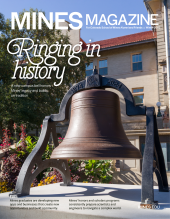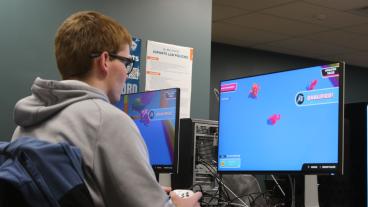University Honors and Scholars programs supporting well-rounded engineers

Students in the Thorson First Year Honors program participate in a design expo where teams demonstrate creative design concepts to address a real-world challenge.

By Cynthia Barnes, Special to Mines Magazine
At first glance, food, humor, the history of human thermodynamics and the philosophy of the Constitution seems to have little relevance to a STEM education, which historically focused on mastering the “hard sciences.”
However, this narrow focus often produced technically proficient yet insular engineers, less prepared to integrate their professional talents with the complex world around them.
In the late 1970s, Mines was one of the first institutions to take on the challenge of graduating students who were not only prepared to succeed in their chosen fields, but who were also equipped with an interdisciplinary, global education that would allow them to lead rich and rewarding lives both personally and professionally.
Today, Mines prepares undergraduate students through eight honors and scholars programs—including the Thorson and Grandey First-Year Honors, Undergraduate Research Scholars, Engineering Grand Challenges Scholars Program, Teach@Mines, Nationally Competitive Scholarships, and the brand-new Future Energy Scholars program.
These followed the signature student experience set by the McBride Honors Program in Public Affairs, which celebrated 45 years in 2024. Originally funded by the National Endowment for the Humanities, the program was a passion of then-Mines president Guy T. McBride and was renamed in his honor upon his retirement.
“I was a very junior member of that seven-member cadre of folks who envisioned this program,” recalled E. Dendy Sloan, university emeritus professor of chemical and biological engineering at Mines. “President McBride recognized that leading a good life required connecting with a broader context than technical engineering and science could provide. It meant addressing larger human problems, ones that were not answered in the back of the book, such as the questions encountered in classic literature and the liberal arts.”
“It was a revolutionary concept at the time,” said Toni Lefton, assistant provost and executive director of the Honors and Scholars Programs. “President McBride wanted our graduates to be good global citizens, to explore culture and place beyond our own backyards, to understand policy, politics and public affairs through an interdisciplinary, humanities lens.”
The McBride Honors program has a long-established ethos of exploring the world and investigating the human condition. The program has evolved a vision for providing students with a holistic and humanistic education into a dynamic program for students and faculty to challenge the limitations of their perspectives and education.
“Every semester, I see how the transformative experiences our students and faculty have during their time in the program carry over into their various communities and other classes,” said Melanie Brandt, director of the McBride Honors program. “Not only do students report that McBride allows them to see the interconnectedness of knowledge in their education, but that it fundamentally expands their minds as they move through the world. Similarly, faculty have embraced the explorative and collaborative space of McBride to develop new pedagogical approaches and innovative courses that they bring back to enrich their home departments.”
“The McBride program gives students today an opportunity I didn’t have, to get a perspective on the world into which their new technologies and new learnings will apply,” said Bruce Henry ’61. Henry described his perspective on the world as “very shallow” before participating in the White House Fellows program in 1973, when he was working as an executive at Polaroid. “We traveled to South Africa, to Russia. It opened up my view of the world and what was going on in the world around me.” Henry thinks programs like McBride allow students to gain those experiences earlier in their professional lives and have an advantage when entering the workforce with those skills.
Current scholars agree. Emma Khorunzhy will graduate in spring 2025 with a minor in public affairs through McBride as well as having participated in the Teach@Mines and Undergraduate Research Scholars programs. She said the experiences have been invaluable. “These programs help develop other parts of people, how you communicate, write, think about the world and how you interact with other people,” she explained. “I really feel like it’s necessary that everyone has some experience that deviates from a strictly STEM education to really just develop themselves as people. And the honors programs really helped develop that.”
Julianne Stevens is a junior who has participated in the Grandey First-Years Honors program, McBride and the Grand Challenges Scholars program. She appreciates being involved in a community that is both supporting and challenging. Stevens has particularly enjoyed courses that examine modern America through a food and cultural lens or those that explore what humor shows about different societies and cultures around the world.
“[The programs have] given me a space to have really neat and more abstract conversations, as well as a place to explore the beauty of different parts of the world, in ways that it’s hard to hold time for,” she said. “I enjoy the way that I’m challenged to think in more of a literary rather than technical mindset and also encouraged to bring those kinds of knowledge together and have them turn into something else that’s new and exciting.”
From the flagship McBride Honors program to the newly launched Future Energy Scholars, Mines continues to lead the way in offering students experiences that will help them succeed long after their undergraduate days are behind them.
Learn more about the University Honors and Scholars Programs at mines.edu/honors.




